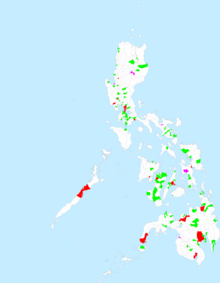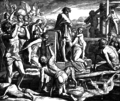Portal:Cities
The Cities Portal

A city is a human settlement of a notable size. The term "city" has different meanings around the world and in some places the settlement can be very small. Even where the term is limited to larger settlements, there is no universally agreed definition of the lower boundary for their size. In a more narrow sense, a city can be defined as a permanent and densely settled place with administratively defined boundaries whose members work primarily on non-agricultural tasks. Cities generally have extensive systems for housing, transportation, sanitation, utilities, land use, production of goods, and communication. Their density facilitates interaction between people, government organizations, and businesses, sometimes benefiting different parties in the process, such as improving the efficiency of goods and service distribution.
Historically, city dwellers have been a small proportion of humanity overall, but following two centuries of unprecedented and rapid urbanization, more than half of the world population now lives in cities, which has had profound consequences for global sustainability. Present-day cities usually form the core of larger metropolitan areas and urban areas—creating numerous commuters traveling toward city centres for employment, entertainment, and education. However, in a world of intensifying globalization, all cities are to varying degrees also connected globally beyond these regions. This increased influence means that cities also have significant influences on global issues, such as sustainable development, climate change, and global health. Because of these major influences on global issues, the international community has prioritized investment in sustainable cities through Sustainable Development Goal 11. Due to the efficiency of transportation and the smaller land consumption, dense cities hold the potential to have a smaller ecological footprint per inhabitant than more sparsely populated areas. Therefore, compact cities are often referred to as a crucial element in fighting climate change. However, this concentration can also have significant negative consequences, such as forming urban heat islands, concentrating pollution, and stressing water supplies and other resources. (Full article...)
Selected city -
Ljubljana (also known by other historical names) is the capital and largest city of Slovenia, located along a trade route between the northern Adriatic Sea and the Danube region, north of the country's largest marsh, inhabited since prehistoric times. It is the country's cultural, educational, economic, political and administrative center.
During antiquity, a Roman city called Emona stood in the area. The city was first mentioned in the first half of the 12th century. It was the historical capital of Carniola, one of the Slovene-inhabited parts of the Habsburg monarchy. It was under Habsburg rule from the Middle Ages until the dissolution of the Austro-Hungarian Empire in 1918. After World War II, Ljubljana became the capital of the Socialist Republic of Slovenia, part of the Socialist Federal Republic of Yugoslavia. The city retained this status until Slovenia became independent in 1991 and Ljubljana became the capital of the newly formed state. (Full article...)Did you know -
- ... that there are few tall buildings on Long Island because residents do not want it to become "Queensified", referring to the neighboring New York City borough?
- ... that the game MicroMacro: Crime City was so popular after its release that print runs repeatedly sold out for eight months?
- ... that City Pier A's clock tower was the first memorial to World War I casualties in the United States, according to a New York City government spokesperson?
- ... that Donald H. Elliott's efforts as the director of New York's planning department helped change the city's skyline?
- ... that early in her career, Maria Calegari danced principal roles in every ballet performed one weekend by the New York City Ballet?
- ... that when the New York City Subway's 14th Street–Union Square station was built, the park above it was raised?
Related portals
Related WikiProjects
Meridian is the eighth most populous city in the U.S. state of Mississippi, with a population of 35,052 at the 2020 census. It is the county seat of Lauderdale County and the principal city of the Meridian, Mississippi Micropolitan Statistical Area. Along major highways, the city is 93 mi (150 km) east of Jackson; 154 mi (248 km) southwest of Birmingham, Alabama; 202 mi (325 km) northeast of New Orleans, Louisiana; and 231 mi (372 km) southeast of Memphis, Tennessee.
Established in 1860, at the junction of the Mobile and Ohio Railroad and Southern Railway of Mississippi, Meridian built an economy based on the railways and goods transported on them, and it became a strategic trading center. During the Civil War, General William Tecumseh Sherman burned much of the city to the ground in the Battle of Meridian (February 1864). Rebuilt after the war, the city entered a "Golden Age". It became the largest city in Mississippi between 1890 and 1930, and a leading center for manufacturing in the South, with 44 trains arriving and departing daily. Union Station, built in 1906, is now a multi-modal center, with access to Amtrak and Greyhound Buses averaging 242,360 passengers per year. Although the economy slowed with the decline of the railroad industry, the city has diversified, with healthcare, military, and manufacturing employing the most people in 2010. The population within the city limits, according to 2008 census estimates, is 38,232, but a population of 232,900 in a 45-mile (72 km) radius and 526,500 in a 65-mile (105 km) radius, of which 104,600 and 234,200 people respectively are in the labor force, feeds the economy of the city. (Full article...)Selected article -

A city (Filipino: lungsod / siyudad / lunsod) is one of the units of local government in the Philippines. All Philippine cities are chartered cities (Filipino: nakakartang lungsod), whose existence as corporate and administrative entities is governed by their own specific municipal charters in addition to the Local Government Code of 1991, which specifies their administrative structure and powers. As of July 8, 2023, there are 149 cities.
A city is entitled to at least one representative in the House of Representatives if its population reaches 250,000. Cities are allowed to use a common seal. As corporate entities, cities have the power to take, purchase, receive, hold, lease, convey, and dispose of real and personal property for its general interests, condemn private property for public use (eminent domain), contract and be contracted with, sue and exercise all the powers conferred to it by Congress. Only an Act of Congress can create or amend a city charter, and with this city charter Congress confers on a city certain powers that regular municipalities or even other cities may not have. (Full article...)General images -
Topics
List articles
Subcategories
Associated Wikimedia
The following Wikimedia Foundation sister projects provide more on this subject:
-
Commons
Free media repository -
Wikibooks
Free textbooks and manuals -
Wikidata
Free knowledge base -
Wikinews
Free-content news -
Wikiquote
Collection of quotations -
Wikisource
Free-content library -
Wikiversity
Free learning tools -
Wiktionary
Dictionary and thesaurus









































